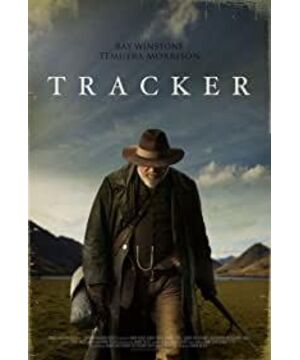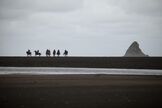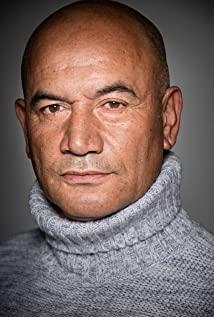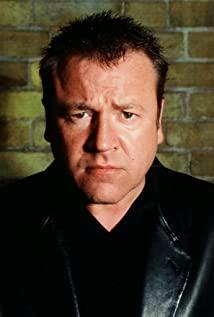Recently, I have started to like New Zealand, and I want to find some information.
But not because of the scenery. A few days ago, I learned that the British Chinese in New Zealand first invented the secret ballot method; later, I noticed that the Transparency International Corruption Perception Index ranked New Zealand first for many consecutive years. Politics is as clean as the landscape, making the landscape appear cleaner to people. Clean scenery cannot be replicated by other countries, but clean politics will undoubtedly set a model for the world to learn from and deserve respect. However, as ridiculous as I am, I have always regarded it as an isolated island in the Pacific Ocean, an insignificant small country attached to the collective name of Western developed countries, and only sees the big boss of Western developed countries - the United States.
Coincidentally came across "Wild Tracker". No matter what country or capital it is filmed, if the place and background of the story are New Zealand, it can be called a New Zealand film.
So look.
If you haven't finished watching it, you can conclude that this is a scenery film. It just shows the beautiful scenery of New Zealand, and the beauty is a bit monotonous. It's just a beautiful grand canyon: beautiful forests, beautiful rivers, beautiful waterfalls, beautiful mountains. It's actually quite boring.
The more you look down, the less energy you seem to get up. Because of its simple plot and complex background. It's as simple as tracking, fighting, escorting, counterattacking, escaping, and tracking again. From the perspective of the fans of Wang Zhaotou in Chongqing, you feel that the whole process is inexplicable, what the stalker and the stalker are saying, how the stalker escapes so easily, etc. It is just a plot that is hard to continue to show the scenery Well! The background is complicated, involving the global colonization of the British Empire, the Anglo-Boers War, the long-cherished wish of the British army and the Maori, etc. These historical facts are not very clear to you. Of course, the more important reason why you feel complicated is that the plot really doesn't need to use such a gorgeous background.
So what is it filming? Isn't it really a New Zealand scenery propaganda film, is it sponsored by the New Zealand government?
As for me, because I am looking at New Zealand's political integrity and its contribution to the world's democratic system, I have focused on human rights awareness, fair trial, procedural justice, substantive justice, and the nature of war from the very beginning. However, what I found, or I was different from what I expected and disappointed me, was that in the end, substantive justice prevailed over procedural justice, and the Boer male lead played the Maori male lead, so the film ended, and the Boers and Maori took the boat. leave New Zealand.
A few days later, I watched it again for the second time. I no longer pay attention to the scenery and tracking mentioned above. I just stare at their conversations, for fear of missing a line of Chinese subtitles (even if I don’t understand English). Here are some of my thoughts:
Why should a war-torn Boer travel all the way to a corner of the world - New Zealand, to participate in a Māori hunt? Is it just because he has the fugitive-anti-tracking skills that the British had not acquired during the Anglo-Boer War? Or do you want to let the two enemies of the British colonists, the Bran and the Maori, meet through tracking, and through their dialogue, develop a deeper theme? Maybe (I can only say maybe, because I can't confirm it), the title of the film, "The Tracker", is to trace the origin of the clean contemporary politics of New Zealand, the bloody, brutal, conquest period that cannot be bypassed, that In a period when the concept of the rule of law was growing, this pair of opposites collided and entangled in that period.
Accompanying the pursuit-escape-fight is the information released by a series of non-continuous dialogues. They are only fragmented fragments. I have tried a lot, but it is difficult to combine them into a complete picture. Perhaps it is to express the sense of fragmentation and the sense of chaos in the transition period in the "period of conflict between the rule of law and violence", or it may be that I lack background knowledge and cannot understand it.
The members of the British troops stationed in New Zealand have their own representatives of the rule of law and violence: the major's gentlemanly style, respect for opponents, obedience to the rule of law procedures, and obedience to duties, contrasted with the rudeness, brutality, racial discrimination of the corporal who is a murderer, Violence at will. His casual violence and manslaughter of military comrades, and put the blame on the Maori, the Maori fled in time, triggering the next tracking. The memory of the Maori's grandfather and father being strangled by the British colonists caused him to doubt whether he could have a fair trial after being arrested. Willing to be brought to stand trial, because he is convinced that all that is left to him is to be hanged, to step on the doom of the elders, so that the soul has nowhere to turn to. However, he still has a chance of being acquitted. The most important physical evidence is the iron fork that caused the death, with only the fingerprints of the corporal who killed his comrade by mistake, but no Maori fingerprints (I am not sure if the iron fork is indeed a tool for the stable, but I will write it like this for the time being ); with fingerprints, the witness statement of the prostitute is not enough. However, the Boers helped him escape, and we don't know whether a fair trial will come to him, and whether the bloody grievances of the previous generation will end with his generation, which means that the spirit of the rule of law has triumphed over brutal killing.
The Boers came to New Zealand with soldiers returning home after the Anglo-Boer War. Participated in the tracking the next day and became the top tracker, keenly checking footprints, bloodstains, etc. like Sherlock Holmes. In the dialogue with the Maori, we can see his inner contradiction: whether to participate in the tracking for the sake of upholding the law or for the bounty, or whether to release the Maori for substantive justice or capture the Maori for procedural justice. And how his South African home was burned by the British, how his old servants, the Hottentots, were hanged by his neighbors, and how his family was put in concentration camps and died for no apparent reason. The trauma of the war was the reason he came to New Zealand, but faced with his enemy and adversary, the Major, the two sides were able to pursue a reconciliation without retaliation soon after the war.
In the conversation between the two, the Maori recalled the words of his hanged father: to fight for freedom. However, he said he fled without taking up the responsibilities entrusted to him by his father. Boers say: Fight for freedom? We went out to fight the British just so that my neighbours could continue to strangle Hottentots like my servants, just because they were different races?
This may be New Zealand, which was in transition a hundred years ago: diverse, confusing, confusing, the old is far from leaving, and the new is coming little by little.
View more about Tracker reviews











